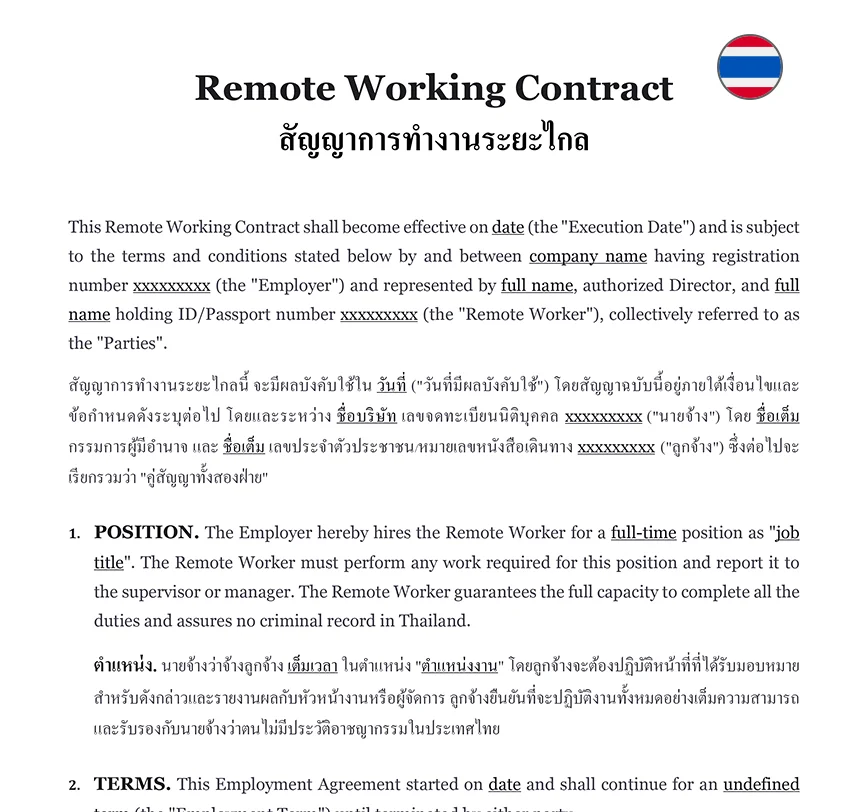Ready to use legal template
Drafted by experienced lawyers
Certified Thai-English translation
Ready to use legal template
Drafted by lawyers
Translated in Thai-English
Learn more about Remote Working Contract
As the landscape of employment continues to evolve, remote work has become a prominent option for both employers and employees. Whether you’re a business looking to hire remote workers or an individual seeking flexible work arrangements, it’s essential to have a comprehensive and legally compliant contract in place. Themis Partner is here to make the process easier for you. Our team of experienced lawyers has meticulously crafted an easy-to-edit legal template tailored to the laws and regulations in Thailand. With our remote working contract template, you can ensure a smooth and secure agreement that protects the interests of all parties involved, while adhering to the legal requirements of the country.
Table of contents
-
What is a Remote Working Contract?
-
Why is a Remote Work Agreement important in Thailand?
-
What should be included in a Remote Working Contract?
-
Are remote workers in Thailand entitled to specific benefits?
-
Can a Work-from-Home Contract be modified or terminated?
-
What should employers be aware of when hiring remote workers?
-
What are the differences with a traditional Employment Contract?
What is a Remote Working Contract?
A Remote Working Contract in Thailand is a legal agreement between an employer and an employee that outlines the terms and conditions of a remote work arrangement. It specifies the rights, responsibilities, and obligations of both parties when the employee performs their job duties outside the traditional office setting, typically from a location of their choosing, such as their home or another remote location within Thailand.
The contract defines various aspects, including work hours, communication protocols, performance expectations, data security measures, and any relevant employment benefits or allowances. It ensures a clear understanding of the working arrangement, protects the interests of both parties, and helps maintain a productive and compliant remote work environment in accordance with the laws and regulations of Thailand.
Why is a Remote Work Agreement important in Thailand?
A Remote Work Agreement in Thailand is of utmost importance as it provides clarity and understanding for employers and employees regarding the terms of the remote work arrangement. It ensures compliance with Thai labor laws, preventing legal issues and penalties.
The agreement safeguards the rights and benefits of both parties, encompassing compensation, working hours, and confidentiality provisions. Emphasizing data security, it protects sensitive information. The agreement’s flexibility caters to specific business and employee needs, while clear performance expectations promote productivity and accountability. In case of disputes, it serves as a reference point, reducing conflicts.
The agreement enhances employee satisfaction and retention by making remote work arrangements more enticing to potential talent.
What should be included in a Remote Working Contract?
1. Parties Details
Clearly state the names and contact details of the employer and the remote worker to establish the identities of the parties entering into the contract.
2. Effective Date and Term
Specify the date when the contract becomes effective and outline the duration of the remote work arrangement, whether it’s for a fixed term or an indefinite period.
3. Scope of Work
Define the nature of the remote worker’s job duties, responsibilities, and deliverables. This section should outline the tasks the employee is expected to perform while working remotely.
4. Working Hours
Clearly state the agreed-upon working hours, including any flexibility or core hours required for collaboration with the team or clients.
5. Location
Mention the remote location from which the employee will be working. This can be a home address or any other suitable remote workspace within Thailand.
6. Equipment and Expenses
Outline the provisions for providing necessary equipment, such as laptops or tools, and clarify who is responsible for covering any work-related expenses.
7. Communication and Reporting
Detail the methods and frequency of communication between the remote worker and the employer, along with any reporting requirements for task updates or project progress.
8. Data Security and Confidentiality
Include clauses related to data handling, security measures, and confidentiality obligations to protect sensitive information and trade secrets.
9. Compensation and Benefits
Specify the remote worker’s salary, payment schedule, and any additional benefits, such as health insurance, paid time off, or reimbursement policies.
10. Termination and Notice Period
Define the conditions and procedures for terminating the contract, including the notice period required from both parties in case of contract termination.
11. Intellectual Property Rights
Address the ownership of intellectual property created during the course of the remote work and clarify who holds the rights to such work.
12. Governing Law and Dispute Resolution
State the jurisdiction and laws that govern the contract and outline the procedures for resolving disputes that may arise between the parties.
ℹ️ Remember that a well-drafted Remote Working Contract protects the interests of both the employer and the remote worker, fosters a clear understanding of expectations, and helps establish a productive and legally compliant remote work arrangement.
Are remote workers in Thailand entitled to specific benefits?
In Thailand, the entitlement to specific benefits for remote workers depends on various factors, including the type of employment, the duration of the work arrangement, and the company’s policies. Certain benefits and rights typically apply to employees, whether they work on-site or remotely. These may include:
1. Social Security Coverage: Employers are required to provide social security coverage for their employees, which includes medical benefits, disability benefits, and retirement benefits.
2. Paid Leave: Employees, including remote workers, are entitled to paid leave, including annual leave, sick leave, and public holidays, as per Thai labor laws.
3. Overtime and Holiday Pay: If remote workers work overtime or on public holidays, they may be entitled to additional pay as per the labor regulations.
4. Health and Safety: Employers must ensure the health and safety of their employees, whether they work in the office or remotely.
5. Maternity and Paternity Leave: Female employees are entitled to maternity leave, and male employees may be entitled to paternity leave.
6. Severance Pay: In the case of termination, employees may be entitled to severance pay based on their years of service.
7. Work-related Expenses: Employers may cover certain work-related expenses for remote workers, such as internet costs or equipment allowances.
It’s essential for employers to adhere to Thai labor laws and regulations when providing benefits to remote workers.
Can a Work-from-Home Contract be modified or terminated?
Yes, a Work-from-Home Contract can be modified or terminated, provided that both parties (the employer and the employee) mutually agree to the changes or termination. Here’s how it generally works:
1. Modification of Work-from-Home Contract
If there is a need to modify any terms or conditions of the existing contract, both the employer and the employee must communicate and agree on the changes. The modification should be documented in writing as an amendment to the original contract, signed by both parties. The changes could include adjustments to working hours, responsibilities, compensation, or any other relevant aspect of the work arrangement.
2. Termination of Work-from-Home Contract
if either the employer or the employee wishes to terminate the Work-from-Home Contract, they should follow the termination provisions stated in the original contract. Typically, there will be a notice period specified that both parties must adhere to when ending the contract. The notice period allows for a smooth transition and ensures that both parties have sufficient time to make necessary arrangements. Termination should be done in writing and acknowledged by both parties.
- Remarks:
If the Work-from-Home Contract is governed by a fixed term, the termination process should be in accordance with the contract’s terms regarding early termination.
What should employers be aware of when hiring remote workers?
When hiring remote workers, employers must be aware of various crucial factors.
Ensuring compliance with local labor laws and regulations, establishing clear remote work policies and written agreements, and prioritizing data security are fundamental.
Employers should provide necessary communication tools, set performance metrics, and maintain inclusivity and fair treatment for remote employees.
Health and safety concerns should not be overlooked, even in remote work settings.
Cultural and time zone considerations, tax implications, and proper onboarding and training processes are essential to fostering a successful and legally compliant remote work arrangement.
Regular communication and support are vital for remote workers’ engagement and well-being, creating a positive and productive remote work environment.
What are the differences with a traditional Employment Contract?
A Remote Working Contract differs from a traditional Employment Contract primarily in its emphasis on the remote work setup.
The main distinctions lie in the specified work location, flexibility in working hours, communication protocols, equipment and expenses provisions, data security and confidentiality measures, and unique performance evaluation criteria.
Remote Working Contracts address the specific needs of remote work arrangements, considering the remote employee’s independence and reliance on digital communication.
The contracts may also include allowances for remote work-related expenses and focus on results-oriented productivity.
As the landscape of employment evolves, employers must adapt these contracts to ensure a successful and compliant working relationship with their remote workforce.
SPECIAL OFFER
HR Pro
15 Document Package
Essential documents for managing employees in Thailand
Work From Home ContractTemplate (.docx)
Save on attorney fees
310 client reviews (4.8/5) ⭐⭐⭐⭐⭐
Share information
Why Themis Partner?
Easy legal documents at your fingertips
Make trusted documents for hundreds of purposes.
Hundreds of documents
Instant access to our entire library of documents for Thailand.
24/7 legal support
Quick legal advice from our network of qualified lawyers.
Easily customized
Editable Word documents, unlimited revisions and copies.
No translation fees
Certified Thai-English translation included for all documents.
Legal and Reliable
Documents written by lawyers that you can use with confidence.
Free consultation
Free lawyer consultation on each new matter.




